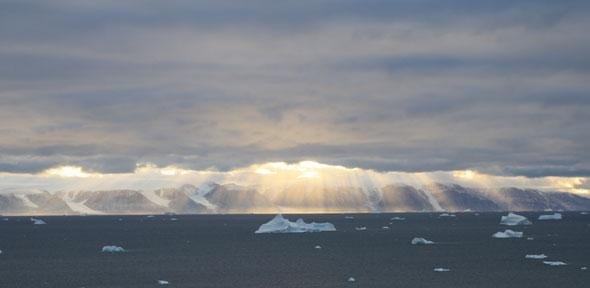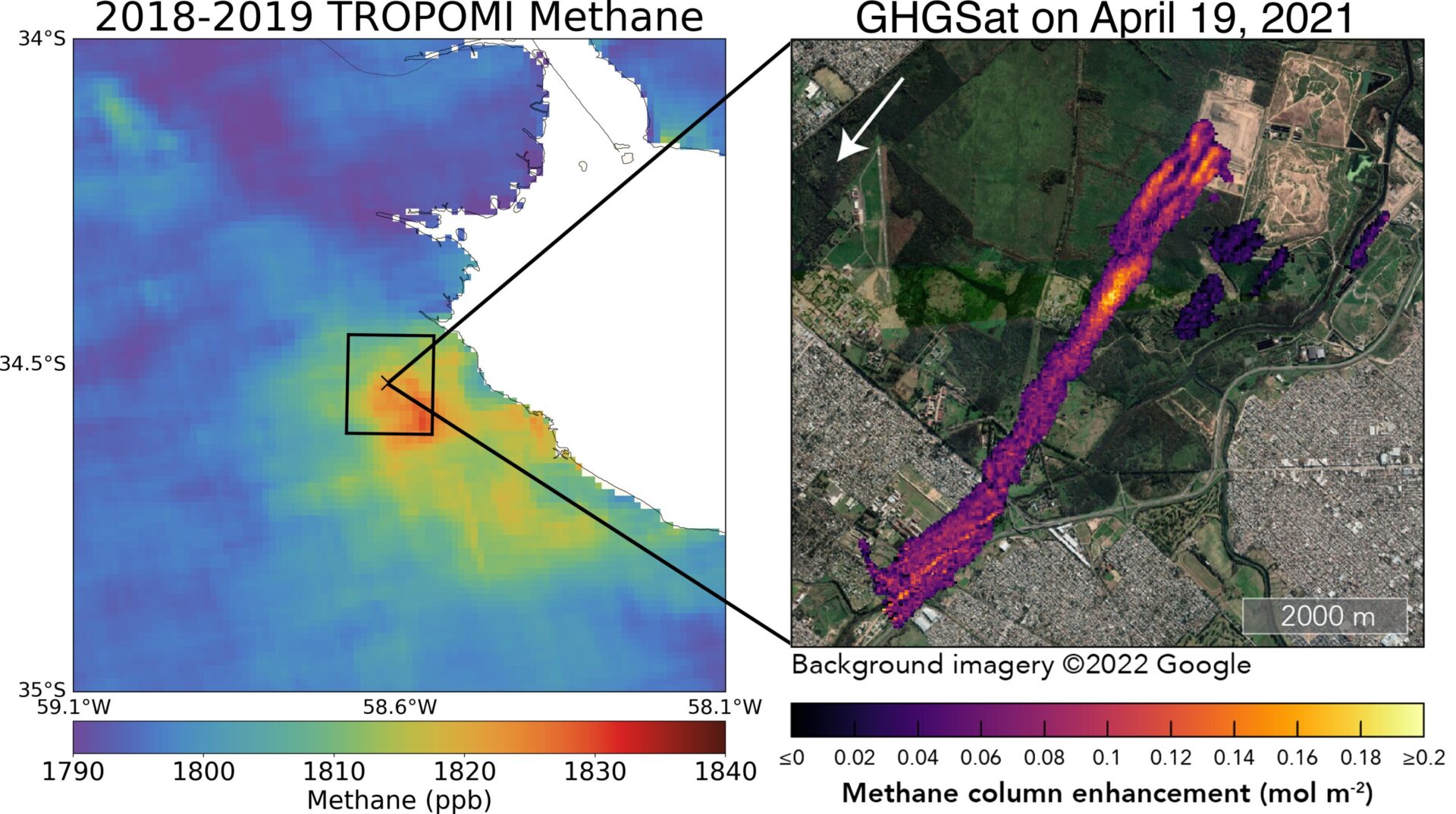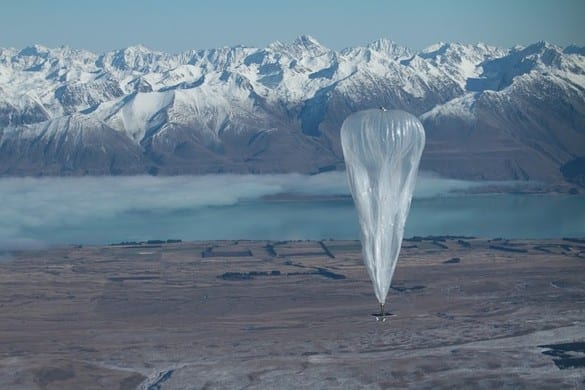
Economic modelling shows that the possible methane emissions caused by shrinking sea ice from just one area of the Arctic could come with a global price tag of 60 trillion dollars – the size of the world economy in 2012.
As the Arctic warms and sea ice melts at an unprecedented rate, hitting a record low last summer, the thawing of offshore ‘permafrost’ – frozen soil – in the region is releasing methane, a powerful greenhouse gas.
Scientists have previously warned that there are vast reservoirs of methane in the Arctic, hundreds of billions of tonnes of a gas many times worse than carbon dioxide for global warming – of which only a fraction needs releasing into the atmosphere to trigger possibly catastrophic climate change.
Now, researchers from Cambridge and Rotterdam have for the first time calculated the potential economic impact of a scenario some scientists consider increasingly likely: that the methane below the East Siberian Sea will be emitted, either steadily over the next 30 years or in one giant “burp”.
Writing in the journal Nature, the academics say that just this area’s methane alone – some 50 billion tonnes, or 50 gigatonnes – would have a mean global impact of 60 trillion dollars, an amount very similar to the size of the entire global economy last year. Current US national debt stands at a mere 16 trillion dollars in comparison.
The economic impact modelled was only for the methane existing on the East Siberian Arctic Shelf, and “the total price of Arctic change will be much higher,” they warn.
“Arctic science is a strategic asset for human economies because the region drives critical effects in our biophysical, political and economic systems,” write the academics, who say that world leaders will “miss the bigger picture” without factoring in Arctic methane projections – as neither the World Economic Forum or the International Monetary Fund currently recognise the economic danger of Arctic change.
The new results were achieved using PAGE09, the latest version of the PAGE integrated assessment model developed by Dr Chris Hope from Cambridge Judge Business School. PAGE09 is currently used by the US Environmental Protection Agency, and an earlier version was used for the UK Government’s Stern Review in 2006 – the major report on climate change economics on which Hope was a specialist advisor.
For the latest research, Hope worked with Gail Whiteman, Professor of Sustainability at Erasmus University, and Cambridge’s Peter Wadhams, Professor of Ocean Physics, who has been studying the disappearance of Arctic ice for 40 years.
The three academics, who co-authored today’s Nature Comment article, built the projections on previous fieldwork in the region by Dr Natalia Shakhova and colleagues from the International Arctic Research Center at the University of Alaska, described by Wadhams as “the only people with the geological knowledge to make estimates about methane emission in this area”.
The PAGE09 model was then employed to translate the extra methane emissions from the East Siberian Sea into global impacts by considering the huge range of environmental changes they might cause – from increasing global temperature and sea levels to consequent flooding, public health and extreme weather.
The model was run 10,000 times to assess the range of risks and provide robust results. The team insist that both the scientific predictions and economic modelling are far from worst-case scenarios, and that the figures represent the mean result from “the whole range of available science and economics”.
“That’s how the model works, how it was used for Stern and by the EPA, it’s the only way I’ll allow it to be used,” said Hope. “The model has to be run with broad ranges for the inputs, it’s not justifiable otherwise.”
“This is the first calculation of its kind that we know of,” he adds, “and we welcome anyone who wants to take this forward and build on it so we can have a discussion – but we don’t have long to discuss it! This is so big and if it happens it could happen fast; people need to wake up to the possible reality we face”.
“This is a warning to the world borne out of many decades of research on all our parts, including forty years of ice thinning measurements from UK submarines,” said Wadhams, “it is a considered statement with enormous implications”.
The Latest Bing News on:
Arctic methane release
- Permafrost Showdownon May 17, 2024 at 7:10 am
From the Arctic to Antarctica the planet is sagging, dripping, slouching, changing the face of 10,000 years of nature coexisting with humanity side-by-side until only recently as it transforms into an ...
- Arctic soil thawing poses risks to Alaskan life and climateon May 8, 2024 at 11:49 am
The frozen soil in Alaska known as permafrost is gradually thawing in many areas because the Arctic region is “warming at a pace three to four times faster than the rest of Earth,” said Bob Bolton, ...
- Thawing permafrost in Norway could release unexpected quantities of methaneon January 22, 2024 at 2:59 am
On the Norwegian archipelago of Svabard, located east of Greenland in the heart of the Arctic ... in a release. “If the consistently frozen permafrost grows thinner and patchier, this methane ...
- Rapidly retreating Arctic glaciers are triggering the release of ancient methane. Here's why scientists are worried.on July 7, 2023 at 7:35 am
The global agriculture industry alone released about 141 megatonnes ... our large uncertainty in methane emissions, particularly in the Arctic," said Kleber More research is needed to confirm ...
- Melting Arctic glaciers unleashes potent greenhouse gason July 6, 2023 at 8:16 am
Scientists are concerned that additional methane emissions released by the Arctic thaw could "ramp-up" human-induced global warming. The springs the researchers studied hadn’t previously been ...
- Arctic microbial ecologyon June 15, 2022 at 4:25 pm
Microbes mineralize the carbon fraction and convert it to carbon dioxide (CO2) and methane (CH4). Climate change models estimate that C released from thawing arctic permafrost might represent the ...
- Good Gas, Bad Gason February 17, 2021 at 7:50 am
The Arctic has warmed much faster than the rest ... triggering a massive methane release that would amplify the warming. A few scientists take seriously a catastrophic scenario in which the ...
- THE ARCTIC MELTDOWNon August 12, 2020 at 8:31 pm
And recent science indicates that vast stores of methane are locked up in the Arctic, which — if released by warming — could dwarf previous global emissions and may already be being released by ...
- Methane Hydrates and Contemporary Climate Changeon January 14, 2020 at 4:02 am
Down the rabbit hole: Toward appropriate discussion of methane release from gas hydrate systems ... Geothermal evidence from permafrost in the Alaskan Arctic. Science 234, 689-696 (1986).
- Scientists name a new reason for methane release in the Arcticon May 23, 2019 at 10:11 pm
Russian scientists came to "understanding of the mechanism of massive methane release from bottom sediments of the East Siberian Arctic shelf," the article reads. Active releases not only ...
The Latest Google Headlines on:
Arctic methane release
[google_news title=”” keyword=”Arctic methane release” num_posts=”10″ blurb_length=”0″ show_thumb=”left”]
The Latest Bing News on:
Methane release
- Landfill study shows flawed detection methods, higher methane emissions in Illinois, other stateson May 20, 2024 at 1:00 am
The U.S. Environmental Protection Agency’s method of detecting methane leaks at landfills is flawed, and emissions of this powerful heat-trapping gas are likely much higher than what is being reported ...
- Abandoned Wells, Methane-Emission Loopholes and Underground Toxic Waste Dumps All Raise Concernson May 17, 2024 at 11:27 am
Thousands of Abandoned Oil and Gas Wells in Texas Are Polluting the Environment There are more than 8,400 orphan oil and gas wells in Texas — but that barely scratches the surface since that count ...
- ‘Significant’ methane exceedances found at landfillson May 16, 2024 at 1:02 pm
A report finding 96 percent of landfills surveyed went over methane reporting thresholds sparked calls for tighter rules.
- Methane Elimination Tech Firm Gets Investment from BC First Nationon May 16, 2024 at 12:00 pm
The Halfway River Group, a group of companies and limited partnerships owned by the Halfway River First Nation in British Columbia, is investing in the methane elimination technology of Kathairos ...
- Zefiro Methane Corp. Announces Quarterly Earnings Report and Provides Corporate Activities Updateon May 16, 2024 at 8:00 am
On February 28, 2024, the Company completed the 90-day integration of its acquisition of Appalachian Well Surveys. The acquisition of the decades-old wireline company was consummated by Zefiro’s ...
- New Mexico Loophole May Allow Record Methane Releaseon May 15, 2024 at 10:13 am
In the first two months of the year, the pipeline company Targa Northern Delaware vented more climate-damaging natural gas from its operations in New Mexico than all other oil and gas producers in the ...
- Opinion: Utah runners must support the EPA methane ruleon May 15, 2024 at 5:05 am
The EPA Methane Rule is poised to be a highly effective and immediate way to reduce methane pollution by instituting new limits that will reduce methane emissions — but it is only the first step.” ...
- Landfills release millions of tons of carbon dioxide. Washington State is responding with new regulations.on May 13, 2024 at 3:39 pm
Landfills generate millions of metric tons of carbon dioxide every year. The Washington Department of Ecology announced new regulations on landfills on Monday.
- Recent study finds 'garbage lasagnas' forming in open landfills across US release staggering amount of air pollution: 'Decades of trash that's sitting under the landfill'on May 12, 2024 at 3:15 am
Researchers discovered that over half had sizable methane plumes, which sometimes lasted for months or years. Recent study finds 'garbage lasagnas' forming in open landfills across US release ...
- West Virginia NBC/ABC Affiliate Televises Story About Zefiro Subsidiary's Expansion into West Virginiaon May 6, 2024 at 4:59 pm
As an originator of high-quality U.S.-based methane offsets, Zefiro aims to generate long-term economic, environmental, and social returns. This news release contains “forward-looking ...
The Latest Google Headlines on:
Methane release
[google_news title=”” keyword=”methane release” num_posts=”10″ blurb_length=”0″ show_thumb=”left”]












